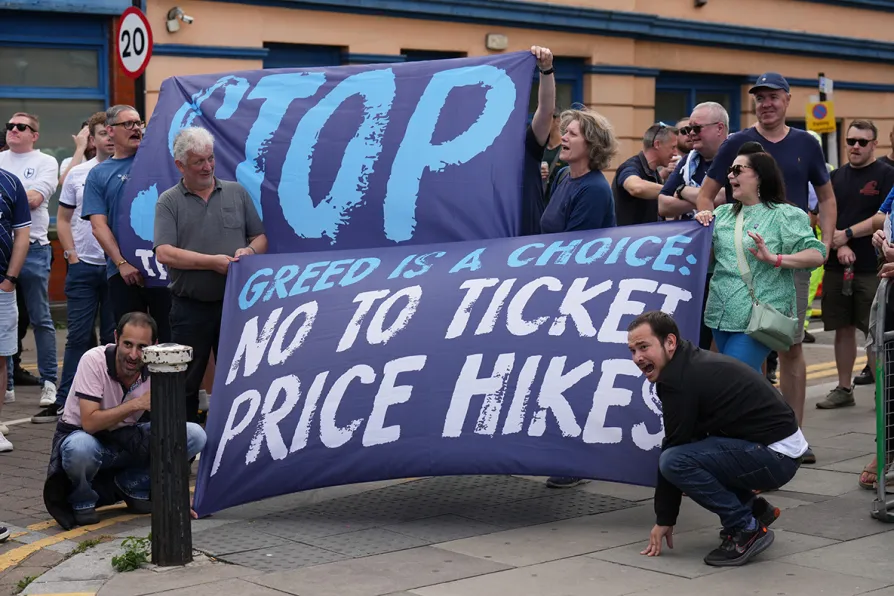JAMES NALTON on Munyua’s stinging success at the World Darts Championship

 Tottenham fans protest againt tickey price hikes
Tottenham fans protest againt tickey price hikes
IT FEELS like there is now a new negative story around top-level football every day. Some off-the-pitch business shenanigans, more dodgy ownership, football becoming a geopolitical tool and supporters being ignored or exploited.
But fans continue to support their teams, looking for the one ray of hope among all the doom and gloom as football charts its own descent into the ills of late capitalism.
In many ways, it would make sense for supporters to give up, turning their back on top-level football in search of something more affordable, inclusive and community-oriented at the lower levels of the game.
But why should the people who built these clubs — whose loyalty, as shown by weekly attendance, paying to watch their team on TV and the many other costs involved in football support — be the ones who are forced to give up?
Their money and dedication, via those TV subs or tickets bought, went towards paying the wages of the players and other figures who played a part in defining these clubs and helped write their stories and history, further tightening the connection with the place and the people.
The time spent on the terraces, often in the most miserable conditions, whether inflicted by the winter weather or a poor performance, counts for something. Watching that game until the end, just in case, despite being down 3-0. They’ve come back from this before so maybe they can do it again!
At least for 90 minutes, the ills of top-level football can still be forgotten, such is the magic of the game that has sadly at the same time made it, its players and its fans so exploitable within the current system in the first place.
The purity remains even among all the capitalist kerfuffle and the geopolitical battles fought using football as a tool.
There is always something for football fans to hold onto, produced by the hope of supporting a team through thick and thin and the stories that creates. The simple joy of watching the next game.
An Ange Postecoglu interview, two Scousers captaining Liverpool, West Ham winning a European trophy, Luton reaching the Premier League, Unai Emery revitalising Villa, Brighton looking like they could win the league, a guy from Stockport looking like the best player in a Man City team of global stars, Everton winning two matches in a row for the first time since 2022, etc.
“We’ll do our best, we understand what it means to all of you folk about this football club,” Postecoglu said at a recent fans’ Q&A event, encapsulating what fans are looking for from their team.
“Our goal is to try to make you happy and proud every time we go out there, so that’s what we’ll try and do.”
A football club can be supported without supporting its owners and what they stand for.
Whether they’re venture capitalists contributing to global capitalism, state owners enhancing or laundering a capitalist state’s position and reputation in the political standoff of money and power, or gambling tycoons whose wealth has been built on the back of exploiting fans via the marriage of sports and betting.
Owners are temporary but supporters are permanent.
Football can be a form of escapism, and many have criticised sport as a distraction from key struggles in other parts of life that appear more real, or more directly related to the everyday. The escapism meaning it benefits the capitalist class as it distracts from the real issues.
But sports, and football especially, given its wide popularity, working-class roots and potential to mobilise groups of people, can also be a vehicle for protest, for holding people to account, inside and outside of the game.
This is seen regularly throughout the sport, in countries like Germany especially with their politically aware and active fanbases bringing issues to the grounds in order to raise awareness and drum up support.
Many UK football grounds now have foodbank collections, highlighting the basic fact that under this government people are going hungry. That food poverty and food insecurity still exist.
Even if some fans might not see this in their day-to-day business, the community element of football raises these issues to a wider audience, and can potentially raise other issues too.
If anything, football and sports can be vehicles for activism rather than distractions from real issues.

JAMES NALTON writes how at the heart of the big apple, the beautiful game exists as something more community-oriented, which could benefit hugely under mayoral candidate Zohran Mamdani

A new front in the fight for football’s soul is emerging — one rooted in trade union values and collective power












